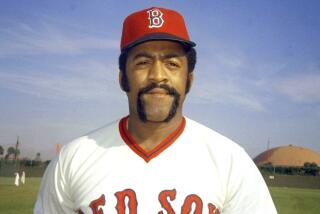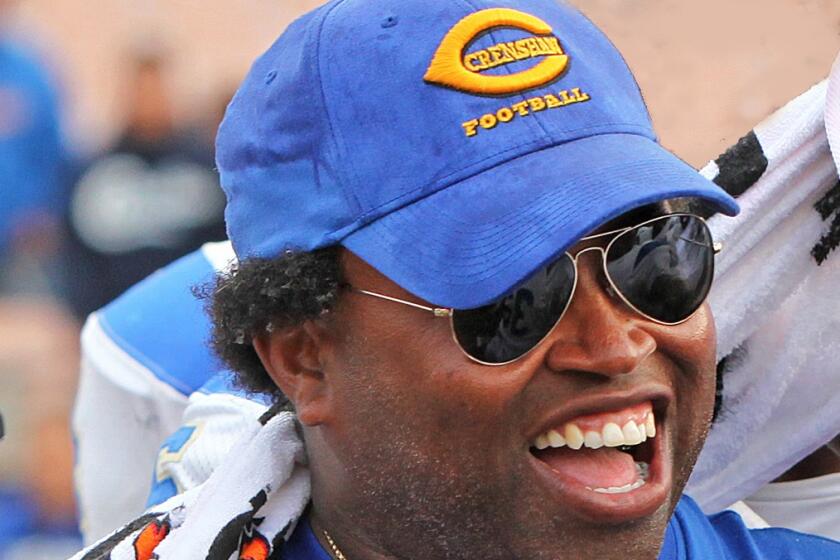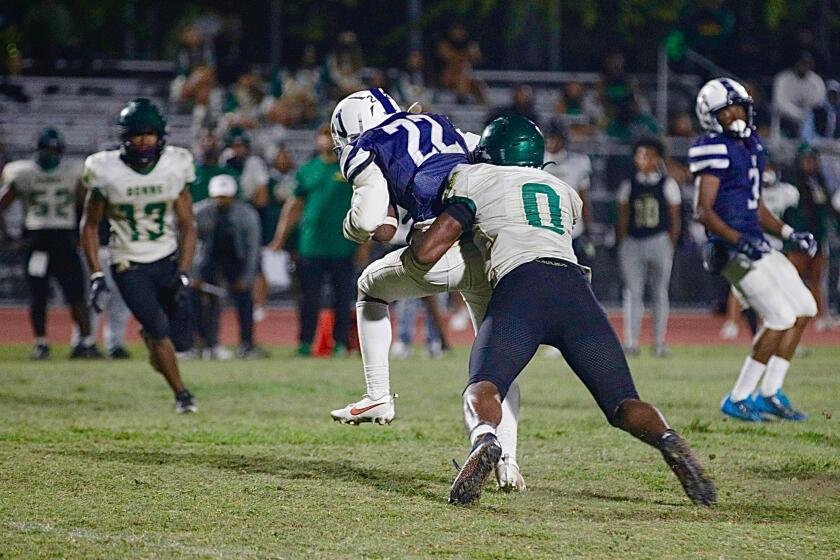Ever-Feisty Durocher Is Dead at 86 : Baseball: Often called Leo the Lip, he was one of the gameâs most controversial figures as a player and manager.
Leo Durocher, one of baseballâs controversial characters, died Monday of natural causes at Desert Hospital in Palm Springs. He was 86.
Nobody ever accused Leo Durocher of being a nice guy, and that was fine with him.
For the record:
12:00 a.m. Oct. 9, 1991 For the Record
Los Angeles Times Wednesday October 9, 1991 Home Edition Sports Part C Page 5 Column 1 Sports Desk 1 inches; 29 words Type of Material: Correction
Baseball--Former pitcher Don Sutton played for the Dodgers, Houston Astros, Milwaukee Brewers, Oakland Athletics and Angels. A photo caption in Tuesdayâs editions incorrectly identified one of the teams.
Durocher, also known as Leo the Lip, was a classic competitor. He used to say, âNice guys finish last,â and it became such an integral part of his life story that he used it as the title of the book he wrote with Ed Linn after his managerial career ended in 1973.
Only once did Durocher deviate from his credo. He didnât turn nice guy; he finished last.
In 1966, after becoming manager of a woebegone Chicago Cub team that had wallowed in the National Leagueâs second division since 1947, Durocher went on a goodwill tour of Illinois, Wisconsin and Iowa with several of his new players. Noting that the Cubs had finished eighth in a 10-team league the previous year, he told his audiences, âThis isnât an eighth-place ballclub.â
As it turned out, Durocher was right. His 1966 Cubs finished 10th.
The Cubs outdid themselves that season, plunging from a 72-90 record to 59-103, which tied the 1962 club for a franchise worst that still stands.
A year later, through a combination of Durocherâs managerial acumen and fortuitous trades, the Cubs astounded everyone by leaping to third place. The 87-74 record that put them in the first division for the first time in 20 years represented a gain of 28 victories.
On the surface, even that accomplishment fell two places shy of satisfying Durocher. He expounded on his philosophy of life in a story written in 1951 by Gilbert Millstein and reprinted in âThe Fireside Book of Baseball.â
âLook, Iâm playing third base,â Durocher said. âMy motherâs on second. The ballâs hit out to short center. As my mother goes by me on the way to third, Iâll accidentally trip her up. Iâll help her up, brush her off and tell her Iâm sorry, but she doesnât get to third.
âThatâs just an exaggeration, but itâs an illustration of what I mean. I want to win all the time. If weâre spitting at a crack in the wall in my office for pennies, I want to beat you at it. Anybody can finish second. I want to finish first if I can. After that, Iâve done my job. Otherwise I havenât.â
If that rigid condition Durocher set for himself is taken at face value, he did his job only three times in 24 seasons as a major league manager. He won with the Brooklyn Dodgers in 1941 and the New York Giants in 1951, losing to the New York Yankees in both World Series, and with the Giants again in 1954, when he hit his managerial peak with a four-game Series sweep over the Cleveland Indians.
Actually, though, lifting the Cubs from 10th place to third was one of the most satisfying achievements of Durocherâs career.
A common rap against Durocher during his tenures with the Dodgers and Giants was that, although he did well with good teams, he seemed to lose incentive when he had a non-contender. By making something out of nothing with the Cubs, he proved his critics wrong.
With the Dodgers and Giants, Durocher found himself surrounded by first-class talent. His runaway favorite was the Giantsâ Willie Mays, whom he considered the greatest player who ever lived.
With the Cubs, Durocher had succeeded the hard way, and he loved the feeling. Since leaving the Giants in 1955, he had been away from managing for 10 years, first taking a job as a television commentator for NBC and then returning to baseball in 1961 to serve four seasons as the Dodgersâ third base coach in Los Angeles.
With the Cubs, Durocher was back in his glory. He was a hero in Chicago because of what he had done for a moribund franchise, and after another third-place finish in 1968, the sky seemed the limit. A team that hadnât won a pennant since 1945 was a prime contender to end that famine in 1969.
It was the first season of divisional play, with expansion teams in San Diego and Montreal, and the Cubs jumped out to a big lead in the National League East. But the September swoon that allowed the supposedly inferior New York Mets to beat them out became a part of baseball lore.
The Cubs followed that second-place finish with another in 1970, then ran third in 1971. Many observers say that if they hadnât folded in 1969, they would have made it two or three in a row.
In the spring of 1972, Durocher said, âThis team should take off and wing it.â
But not only did the Cubs not wing it, Durocher didnât finish the season. Owner Phil Wrigley fired him after 90 games, with a 46-44 record.
He was 67 then, but he still wouldnât quit. He was hired a month later as manager of the Houston Astros, and stayed through the 1973 season before finally retiring.
As successful as Durocher was--2,008-1,709--controversy followed wherever he went.
In his playing days, Durocher was a âgood-field, no-hitâ shortstop. A .247 lifetime hitter, he was often referred to as an All-American out. But he was an overachiever, and his competitive instincts made him a two-time All-Star in a major league career that ran from 1925 to 1945. He played for the Yankees, Cincinnati Reds, St. Louis Cardinals and Dodgers.
The Cardinals of the mid-â30s were called the Gashouse Gang, and one of the prime reasons was the inspirational play of Durocher. In the first four of his five seasons in St. Louis (1933-â37), he had the best run of his career with averages of .253, .260, .265 and .286. He drove in 70 runs in 1934 and a personal-best of 78 in 1935.
The zenith of Durocherâs playing career occurred in 1934, when the Cardinals won the pennant and beat the Detroit Tigers in the World Series. Second baseman Frankie Frisch was the manager, but Durocher was his co-leader on the field.
As a brash rookie with the Yankees, Durocher committed the mistake of rubbing Babe Ruth the wrong way. He once gave Ruth a black eye, which made his exit from New York inevitable. The Yankees put him on waivers after the 1929 season and their loss was the Redsâ gain.
Along the way, Durocher had tiffs with other teammates, and some of his run-ins with umpires would be highlight material on television today.
What really got him into trouble, though, was his alleged association with gamblers. He even consorted with gangster Bugsy Siegel. These relationships, plus his own gambling, caused Commissioner Happy Chandler to suspend him from baseball for the 1947 season.
The Dodgers took Durocher back in 1948, but in midseason, he suddenly went across town to manage the hated Giants.
That led to Durocherâs greatest success. When Bobby Thomson hit âthe shot heard âround the worldâ in 1951, a home run that beat the Dodgers in a best-of-three playoff, Durocher had turned a fifth-place team into a pennant winner in three years. The Giants came from 13 1/2 games behind in mid-August to tie the Dodgers in what came to be known as âthe miracle of Cooganâs Bluff.â
After another fifth-place finish in 1953, the Giants gave Durocher his only World Series championship ring by springing one of the most startling upsets in baseball history. The 1954 Indians won 111 games, setting an American League record that still stands, yet couldnât win a game from the Giants.
Obviously, Durocherâs feat of turning the Cubsâ fortunes around in only two seasons also ranked high on his memory list. At the same time, however, the Cubsâ inability to win a pennant or even a division title in his 6 1/2 seasons in Chicago created his greatest frustration.
The 1969 Cubs were loaded with talent. They had three future Hall of Famers in Ernie Banks, Billy Williams and Fergie Jenkins, a fourth Hall of Fame candidate in Ron Santo, and such other notables as Randy Hundley, Glenn Beckert, Don Kessinger, Jim Hickman, Ken Holtzman, Bill Hands and Phil Regan. Their entire infield of Banks, Beckert, Kessinger and Santo played in the All-Star game, as did Williams and Hundley.
Predictably, Durocher got much of the blame for the teamâs collapse. He was second-guessed for not making enough use of his bench and secondary pitching, thus wearing out his eight everyday players and four key pitchers.
Such criticism might have been justified, but Durocher made a couple of moves off the field that got him in hot water. Some people think they did irreparable damage to team morale.
On the morning of June 18, Durocher checked out of the teamâs hotel in Pittsburgh and flew to Chicago for his wedding--set for the next day--to Lynn Walker Goldblatt. It was No. 4 for Leo, No. 3 having been screen actress Laraine Day.
Durocher didnât tell a soul he was leaving, not even Coach Pete Reiser, who had to serve as manager pro tem.
Jim Enright, in his book, âChicago Cubs,â quoted a dumbfounded Wrigley as saying, âI donât like the way Leo walked away from the team without saying anything in advance, but weâll just have to forgive him this time.â
On July 26, Durocher jumped ship again, and this time it was during a game. The Cubs were playing on national television against the Dodgers when Durocher hopped a chartered plane to visit his brideâs son, Joel, at Camp Ojibwa in Rhinelander, Wis. Again Reiser took over.
A press-box announcement said that Durocher had become ill, and it wasnât until almost midnight that Cub officials learned he had gone to Camp Ojibwa.
Enright quoted Wrigley in his book: âI was told Leo was sick. I had no idea he wasnât confined to his home. In view of the all-out effort everybody in the organization is making to win the pennant, I feel Leo owes an apology to management and all the players and coaches and fans. You canât run a ship without a rudder.â
Durocher also invited trouble with his attitude toward Banks, Mr. Cub. He tried, unsuccessfully, to talk Wrigley into trading Banks, an icon with Cub fans then and now.
The good-natured Banks took Durocher in stride, but some other players didnât. Santo, for example, almost threw a punch at Durocher during a team meeting in 1971.
Away from baseball, Durocher was the sharpest of dressers--he wore the most expensive clothes money could buy--and had a personality that could charm almost anybody. He was as much at ease mingling with high society as he was holding court with reporters.
His image problem notwithstanding, Durocher had an outstanding career, probably a Hall of Fame career, although he hasnât yet been so honored.
Rick Talley addressed the subject in his book, âThe Cubs of â69,â when he wrote, âIf not for Leoâs behavior, his name would long ago have been emblazoned in the Hall of Fame at Cooperstown.â
Nobody was more cognizant of this than Durocher himself. In recent years, he went to Mass regularly, sometimes even passing the collection basket.
Talley quoted Durocher as saying several years ago, âIâm not worried about getting into Cooperstown. Iâm more worried about the gates upstairs being opened.â
REACTION: His desire to win gave Durocher a fiery demeanor, but he had another side. C6
More to Read
Go beyond the scoreboard
Get the latest on L.A.'s teams in the daily Sports Report newsletter.
You may occasionally receive promotional content from the Los Angeles Times.










